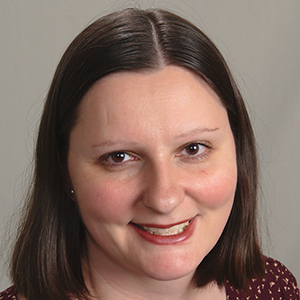Myers finds a new way
to look at proteins
Growing up as an aspiring artist, Sam Myers became interested in science later in life. When he took a human biology class at his junior college, it blew him away.
 Sam Myers and his team developed genomic locus proteomics, which researchers can use to uncover mechanisms that underlie genetic phenomena.
Sam Myers and his team developed genomic locus proteomics, which researchers can use to uncover mechanisms that underlie genetic phenomena.
Myers majored in biochemistry with an emphasis in chemistry at California Polytechnic State University and then did graduate work at the University of California, San Francisco, where he studied O-GlcNAc signaling in pluripotent stem cells in Al Burlingame’s lab. He did his postdoctoral research in Steven Carr’s proteomics laboratory at the Broad Institute in Cambridge, Massachusetts, where he is now a research scientist.
Myers knew he wanted to “bridge biology and technology development,” he said, especially as “science moves toward requiring more interdisciplinary approaches to research.”
He has developed a unique skill set to bridge this gap in the field of proteomics, an area of research with great potential for discovery, he said. “Many people work at the genomics level measuring RNA levels, but proteins and proteomes haven’t been studied nearly as much.”
Many sample types do not have enough material for proteomic analyses, so Myers has reduced the sample requirements needed to study the proteome, enabling researchers to answer new biological questions by looking at proteins at a single locus in the genome.
“This has been needed for a long time,” he said, and he just “had the perfect alignment” of scientific expertise in Cambridge. He was able to draw on the skills of Alice Ting (APEX2), Feng Zhang (Cas9) and Carr (quantitative proteomics) to perform this work.
In addition to doing research, Myers enjoys being part of outreach programs that get children interested in science, technology, engineering and math. He is able to connect with youngsters in part, he said, because “I don’t look like a typical scientist.”
When children see scientists who look like they could be artists or in a motorcycle gang, it makes the profession more accessible to more types of people, he said, and diversity is paramount for scientific progress.
Finding proteins at a genomic locus
Sam Myers’ work focuses on developing proteomic approaches to study transcriptional regulation and cellular differentiation. He recently reported a method to discover proteins associated with a single genomic locus within the native cellular context.
Myers and his team developed a dCas9-APEX2 fusion to enrich and identify proteins interacting with specific genomic loci in a novel method that is not dependent on antibodies or genomic engineering. Myers believes this method, termed genomic locus proteomics, will enable researchers to uncover the mechanisms that underlie genomic phenomena, such as single nucleotide polymorphisms identified in genomewide association studies or enhancer-promoter interactions and the proteins that drive their function.
At the American Society for Biochemistry and Molecular Biology annual meeting, Myers will talk about the tools and approaches he develops to understand gene expression. This includes a study published in the journal Nature Methods looking at proteins associated with important oncogene promoters and how this method can be extended to better characterize single genomic loci in cells.
Enjoy reading ASBMB Today?
Become a member to receive the print edition four times a year and the digital edition monthly.
Learn moreGet the latest from ASBMB Today
Enter your email address, and we’ll send you a weekly email with recent articles, interviews and more.
Latest in People
People highlights or most popular articles

Building a career in nutrition across continents
Driven by past women in science, Kazi Sarjana Safain left Bangladesh and pursued a scientific career in the U.S.

Kiessling wins glycobiology award
She was honored by the Society for Glycobiology for her work on protein–glycan interactions.

2026 ASBMB election results
Meet the new Council members and Nominating Committee member.

Simcox wins SACNAS mentorship award
She was recognized for her sustained excellence in mentorship and was honored at SACNAS’ 2025 National Conference.

From humble beginnings to unlocking lysosomal secrets
Monther Abu–Remaileh will receive the ASBMB’s 2026 Walter A. Shaw Young Investigator Award in Lipid Research at the ASBMB Annual Meeting, March 7-10 in Washington, D.C.

Chemistry meets biology to thwart parasites
Margaret Phillips will receive the Alice and C. C. Wang Award in Molecular Parasitology at the ASBMB Annual Meeting, March 7-10 in Washington, D.C.

